Are you currently dealing with a pest problem in your rental property? If so, you may be wondering who is responsible for taking care of the issue. In our latest blog post, we tackle the common renting dilemma of pest control and provide some much-needed clarity on this topic. Whether you’re a tenant or a landlord, understanding your rights and responsibilities when it comes to pest control is crucial. Join us as we explore this issue and offer helpful advice on how to handle pest infestations in your rental property.
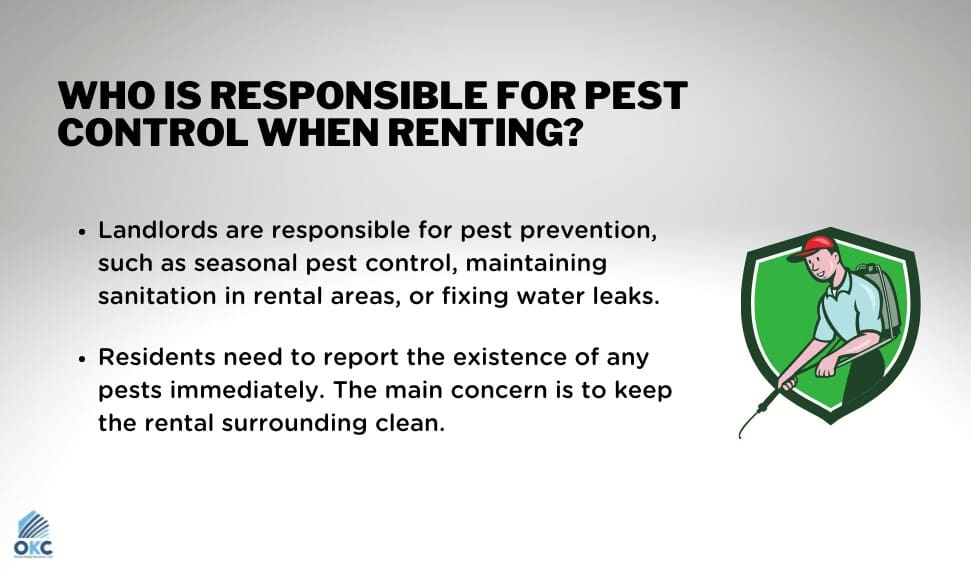
Legal Responsibilities
When it comes to pests in a rental property, the responsibilities can be a bit complex. Both landlords and tenants have certain duties to fulfill in order to maintain a healthy and pest-free living environment. Understanding these legal responsibilities is crucial for all parties involved.
Landlord’s Duty
As a landlord, you have a legal obligation to provide your tenants with a safe and habitable living space. This includes taking reasonable measures to prevent and control pest infestations. It is your responsibility to ensure that the property is free from any existing pests before the tenant moves in.
Tenant’s Responsibility
As a tenant, you also have a role to play in pest control. You are responsible for maintaining cleanliness and hygiene in your rented space. This means properly disposing of trash, cleaning up spills and crumbs, and keeping the living areas tidy. By doing so, you can help prevent pest infestations and minimize the risk of attracting unwanted critters.
Written Agreements
To avoid any confusion or disputes, it is advisable to have a written agreement between the landlord and the tenant that clearly outlines the responsibilities of both parties regarding pest control. This agreement should specify who is responsible for pest control, how often inspections will be conducted, and what steps will be taken in the event of an infestation.
Common Types of Pests
Pest infestations can occur in various forms and can cause significant damage to both the property and the well-being of the occupants. Here are some of the most common types of pests that landlords and tenants may encounter:
Rodents
Mice and rats are notorious invaders that can quickly multiply and wreak havoc in a property. They not only damage structures, but they can also carry diseases and contaminate food. Rodents can enter through small gaps and cracks in the building, making it essential to seal any potential entry points.
Insects
Insects such as ants, flies, and beetles are common pests that can become a nuisance in rental properties. They are attracted to food sources and can easily find their way into the living spaces. Proper waste management and regular cleaning can help prevent insects from infesting the property.
Bed Bugs
Bed bugs are small, flat insects that infest beds and furniture. They feed on the blood of humans and animals, causing itchy and uncomfortable bites. Bed bug infestations are often difficult to eradicate and require professional treatment.
Cockroaches
Cockroaches are resilient pests that can thrive in various environments. They are known to spread diseases and allergens, making them a significant health concern. Proper cleanliness and sealing cracks can help prevent cockroach infestations.
Termites
Termites are silent destroyers that can cause extensive damage to the structure of a rental property. They feed on wood and can weaken the building’s foundation over time. Regular inspections and prompt treatment are essential for preventing and eliminating termite infestations.
Ants
Ants are social insects that can quickly establish colonies in and around a property. They are attracted to food sources and can enter through even the tiniest cracks. Good hygiene practices, such as cleaning up spills and storing food properly, can help deter ant infestations.
Mosquitoes
Mosquitoes are not only annoying, but they can also transmit diseases such as malaria, dengue, and Zika virus. Removing standing water sources, using mosquito nets, and applying mosquito repellents can help reduce the risk of mosquito infestations.
Birds
Birds can become pests when they build nests in or around rental properties. Their feces can damage surfaces and spread diseases. It is important to discourage bird nesting by blocking access to nesting areas.
Squirrels
Squirrels may find their way into rental properties through small openings in roofs or walls. They can cause damage by chewing on wires and insulation. Proper maintenance of the property, such as sealing entry points, can help prevent squirrel infestations.
Wildlife
Wildlife pests such as raccoons, skunks, and opossums can cause damage and pose a threat to both tenants and the property. Encouraging a clean and well-maintained outdoor environment can help deter wildlife from entering the premises.
Prevention and Maintenance
Prevention is key when it comes to pest control in rental properties. By implementing certain measures, both landlords and tenants can minimize the risk of infestations. Here are some important prevention and maintenance techniques to consider:
Cleanliness and Hygiene
Good hygiene practices are essential for keeping pests at bay. Tenants should regularly clean their living areas, promptly clean up spills, and properly store food to prevent attracting pests. Landlords can encourage cleanliness by providing proper waste disposal facilities and educating tenants about the importance of cleanliness.
Sealing Entry Points
The construction of a rental property may have small gaps or cracks that can serve as entry points for pests. Landlords should inspect the property for potential entry points and seal them off. This includes checking for cracks in walls, gaps under doors, and openings in windows. Regular maintenance and repair can help keep pests out.
Proper Waste Management
Trash and food waste can attract pests, especially insects and rodents. Tenants should dispose of their garbage properly and use sealed containers. Landlords can provide adequate and hygienic waste disposal facilities, such as trash bins with tight-fitting lids, to discourage pests.
Regular Inspections
Both landlords and tenants should conduct regular inspections to identify any signs of pests or potential entry points. Landlords should perform thorough inspections of the property before new tenants move in and periodically thereafter. Tenants should report any signs of infestation immediately to the landlord.
Landscaping and Yard Maintenance
Proper landscaping and yard maintenance can help prevent pests from entering the property. Regularly trimming trees and shrubs, removing debris, and keeping the lawn well-maintained can reduce hiding places for pests. Landlords should ensure that landscaping practices are in line with pest control measures.
Immediate Actions for Tenants
If tenants notice any signs of a pest infestation in their rental property, it is important to take immediate action to prevent the problem from worsening. Here are some steps tenants should take:
Notifying the Landlord
Tenants should promptly notify their landlord or property manager about any signs of a pest infestation. This can be done through written communication, such as email or a formal letter, to ensure a record of the notification.
Documenting the Problem
Taking photos or videos of the pest infestation can help provide evidence of the issue. Tenants should document the extent of the infestation, including any damages caused by the pests. This documentation can be helpful when discussing the problem with the landlord or seeking professional help.
Seeking Professional Help
Depending on the severity of the infestation, tenants may need to seek professional pest control services. Professional exterminators have the knowledge and tools to effectively eliminate pests and prevent their return. Tenants should consult with the landlord before hiring a professional to determine who will cover the cost of the service.
Temporary Pest Control Measures
While waiting for professional assistance, tenants can take some temporary measures to minimize the impact of the infestation. This may include using homemade remedies or store-bought traps and baits. However, it is important to understand that these temporary solutions may not fully eradicate the problem and should not replace professional treatment.
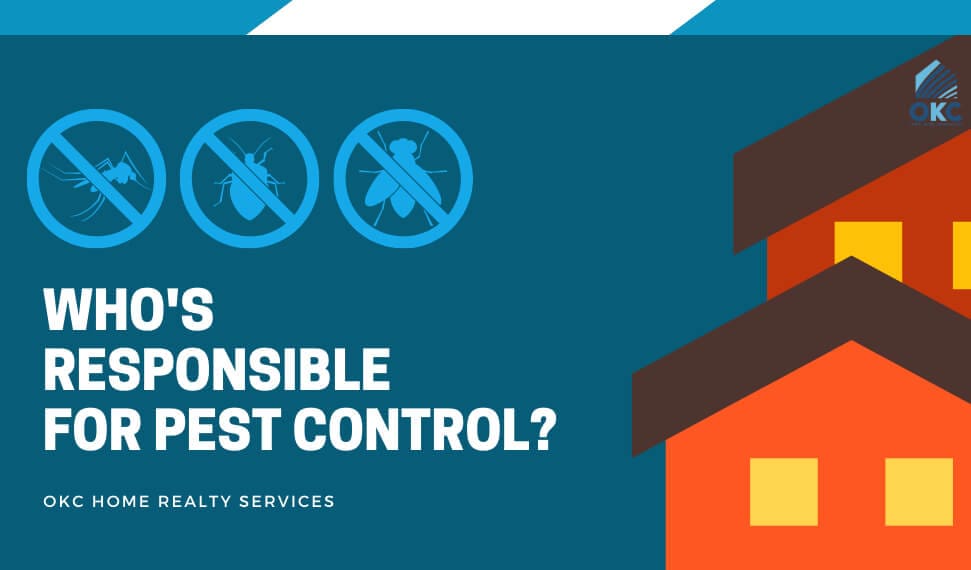
Landlord’s Response and Responsibilities
Once the landlord is notified of a pest infestation, they have certain responsibilities to fulfill. Here’s what landlords should do in response to a pest problem:
Timely Communication
Landlords should respond to tenant notifications of pest infestations in a timely manner. Effective communication is crucial to ensure that the issue is addressed promptly. Landlords should keep tenants informed about the steps being taken to resolve the problem.
Arranging for Pest Control
Landlords are generally responsible for arranging and coordinating the pest control services needed to address the infestation. This includes hiring professional pest control companies or licensed exterminators to assess the situation and implement the necessary treatment.
Hiring Licensed Professionals
It is important for landlords to hire licensed and reputable pest control professionals. These professionals have the expertise and knowledge to address the specific pest problem and use safe and effective methods for pest control.
Covering Costs
In most cases, landlords are responsible for covering the costs associated with pest control services. However, this may vary depending on the terms of the lease agreement and local laws. It is essential for landlords and tenants to clarify who will be responsible for the expenses related to pest control beforehand.
Ensuring Effective Treatment
Landlords must ensure that the pest control treatment is effective and addresses the root cause of the infestation. This may involve multiple visits from the exterminator and follow-up inspections to ensure that the pests are completely eliminated.
Tenant’s Rights to Break Lease
In certain circumstances, tenants may have the right to break their lease due to severe pest infestations. Here are some situations where tenants may be entitled to terminate their lease agreement:
Severe Infestation
If the pest infestation is severe and poses a significant health and safety risk to the tenant, they may have grounds to break their lease. Severe infestations can include extensive damage to the property or the presence of pests that carry diseases.
Health Hazards
If the infestation is causing health hazards for the tenant, such as severe allergies or respiratory issues, they may have the right to break their lease. It is important for tenants to document any health-related issues caused by the infestation to support their case.
Inadequate Landlord Response
If the landlord fails to address the pest infestation in a timely and effective manner, tenants may have the right to terminate the lease. Landlords have a legal responsibility to provide a habitable living environment, and failure to do so can be a breach of the lease agreement.
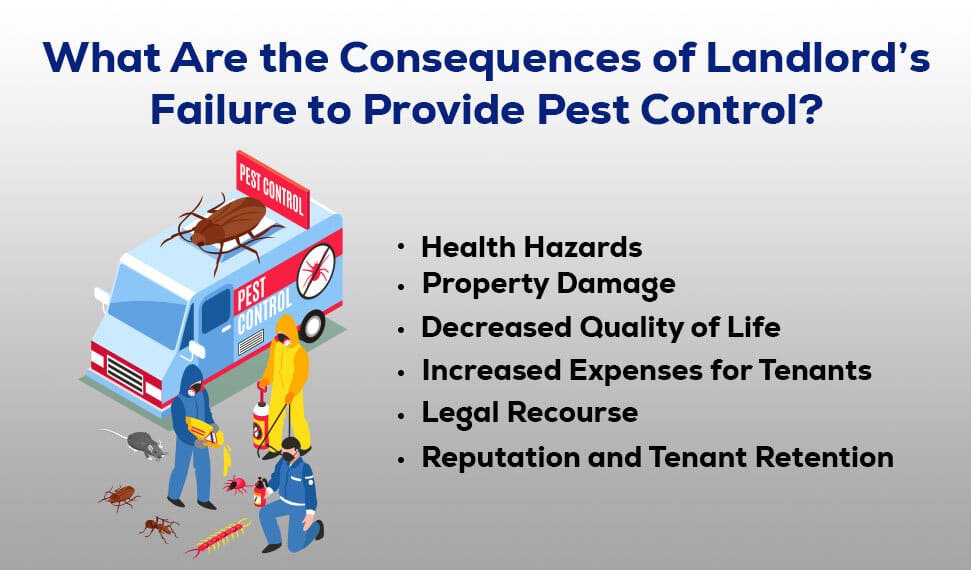
Tenant’s Pest Control Options
When dealing with a pest infestation, tenants have several options for pest control. Here are some options tenants can consider:
Self-Remediation
In cases where the infestation is minor, tenants may attempt self-remediation using natural, DIY methods. This can include using homemade pest repellents, traps, or baits. However, it is important to note that self-remediation may not always be effective, especially for severe infestations.
Professional Pest Control Services
For more severe or persistent infestations, tenants should consider hiring professional pest control services. These professionals have the expertise and knowledge to effectively eliminate pests and prevent their return. Tenants should consult with the landlord before hiring a professional to determine who will cover the cost of the service.
Using Natural or DIY Methods
Some tenants may prefer to use natural or DIY methods to control pests. This can include using essential oils, vinegar, or other homemade remedies. While these methods may be effective in certain situations, it is important to research and follow proper instructions to ensure their safety and efficacy.
Preventing Future Infestations
Prevention is key to avoiding future pest infestations. Tenants should follow proper hygiene practices, seal entry points, and promptly report any signs of pests to the landlord. By being proactive and taking preventive measures, tenants can minimize the risk of future infestations.
Landlord’s Pest Control Obligations
Landlords have specific obligations when it comes to pest control in rental properties. Here are some key obligations that landlords should fulfill:
Maintaining a Pest-Free Property
Landlords should take proactive measures to maintain a pest-free environment. This includes regular inspections, proper waste management, and ensuring that the property is properly sealed to prevent entry by pests.
Regular Inspections
Landlords should conduct regular inspections of the property to identify any signs of pests or potential entry points. Regular inspections can help detect and address pest problems early on, minimizing the impact on tenants and the property.
Addressing Pest Complaints
When tenants report a pest problem, landlords should promptly address the issue. Effective communication and timely action are crucial to resolve the problem and ensure tenant satisfaction.
Educating Tenants
Landlords should educate tenants about pest control measures and the importance of cleanliness and hygiene. Providing guidelines or informational materials can help tenants understand their role in preventing and controlling pests.
Proper Waste Disposal Facilities
Landlords should provide proper waste disposal facilities to encourage tenants to dispose of their trash properly. This may include providing trash bins with tight-fitting lids and arranging for regular garbage collection.
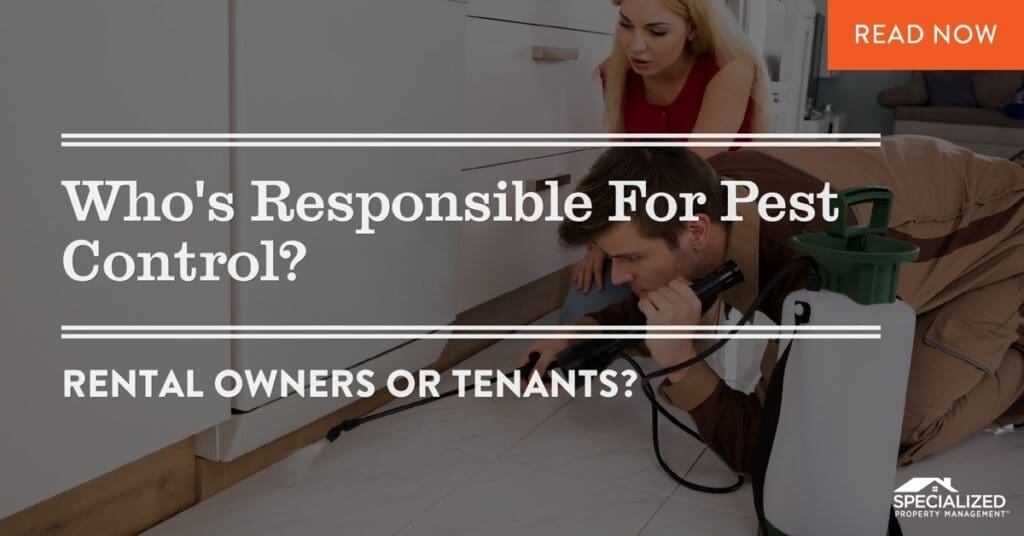
Legal Disputes and Recourse
In some cases, disputes may arise between landlords and tenants regarding pest control responsibilities. Here are some options for resolving legal disputes related to pest control:
Mediation and Arbitration
Mediation and arbitration can be effective methods of resolving disputes without going to court. Both parties can present their arguments and work towards a mutually agreeable solution with the help of a neutral third party.
Small Claims Court
If the dispute cannot be resolved through mediation or arbitration, tenants may consider taking the matter to small claims court. Small claims court allows individuals to pursue legal action for disputes involving a limited amount of money. Tenants should consult with a lawyer or legal professional for guidance on the process.
Contractual Obligations
The terms of the lease agreement can play a significant role in determining the responsibilities of both parties regarding pest control. If there is a breach of the lease agreement, the aggrieved party may have legal recourse.
Tenant’s Rights
Tenants have rights when it comes to a safe and habitable living environment. If a landlord fails to fulfill their responsibilities regarding pest control, tenants may have the right to terminate the lease, seek compensation, or take legal action. It is important for tenants to familiarize themselves with their rights and consult legal professionals if needed.
Conclusion
Pest control responsibilities in rental properties can vary depending on the specific circumstances and the terms of the lease agreement. Both landlords and tenants have important roles to play in preventing and addressing pest infestations. By understanding their legal responsibilities and taking proactive measures, landlords and tenants can maintain a healthy and pest-free living environment. Effective communication, proper maintenance, and timely action are key to resolving pest-related issues and ensuring the well-being of all parties involved.
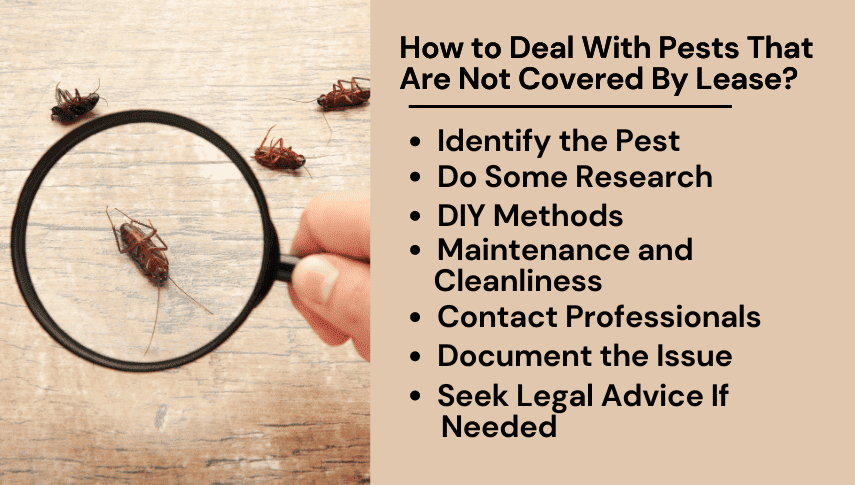

I am Randy, the author behind PestControld.com. Drawing from decades of experience, I aim to provide valuable insights, expert advice, and practical recommendations to help you make informed decisions when assessing viable pest control solutions.